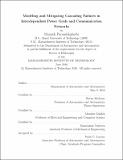Modeling and mitigating cascading failures in interdependent power grids and communication networks
Author(s)
Parandehgheibi, Marzieh
DownloadFull printable version (15.19Mb)
Other Contributors
Massachusetts Institute of Technology. Department of Aeronautics and Astronautics.
Advisor
Eytan Modiano.
Terms of use
Metadata
Show full item recordAbstract
Many of today's critical infrastructures are organized in the form of networks, which are dependent on one another. A particular example is the power grid and the communication network used to control the grid. While this dependence is beneficial during normal operation, as it allows for more efficient operation, it can be harmful when the networks are under stress. Indeed, in such interdependent network infrastructures, a cascade of failures may occur where power failures can lead to communication failures, which, in turn, lead to cascading power failures. Therefore, it is necessary to develop proper models and analytical tools to asses the robustness of interdependent networks to failures. In this thesis, we develop such models with emphasis on interdependent power grids and communication networks. Initially, we focus on the abstract modeling of interdependent networks. In particular, we propose a new model for interdependent networks with known topologies, define and analyze metrics for assessing the robustness of such networks to cascading failures, and propose algorithms for robust design of interdependent networks. Next, we focus on the interactions between power grids and communication and control networks. We model the cascading failures in the power grid using the power flow equations, and use the communication network to implement a control policy in the power grid which mitigates cascading failures in interdependent networks. Using this model, we show that the interdependent power grids are more robust than isolated ones. Finally, we model the impact of communication loss on the performance of power grids under two different control scenarios. The first one is the emergency control mechanism where failures in the power grid should be monitored and mitigated by the control center. In this case, we investigate the impact of simultaneous communication failures on the performance of such control mechanisms. In particular, we propose new emergency control schemes for partial communication networks, and investigate the network parameters that are most effective in causing the cascade of failures from communication networks to the power grid. The second control mechanism is distributed frequency control in power grids. We show that the optimal solution will not be achieved under communication link failures. We propose a novel control mechanism that uses the power dynamics instead of direct information from the communication network, and show that it achieves the optimal solution and is globally asymptotically stable. We also analyze the impact of discrete-time communication on the performance of distributed frequency control. We show that the convergence time increases as the time interval between two messages increases, and propose a new algorithm that uses the dynamics of the power grid to decrease the convergence time.
Description
Thesis: Ph. D., Massachusetts Institute of Technology, Department of Aeronautics and Astronautics, 2016. This electronic version was submitted by the student author. The certified thesis is available in the Institute Archives and Special Collections. Cataloged from student-submitted PDF version of thesis. Includes bibliographical references (pages 139-146).
Date issued
2016Department
Massachusetts Institute of Technology. Department of Aeronautics and AstronauticsPublisher
Massachusetts Institute of Technology
Keywords
Aeronautics and Astronautics.